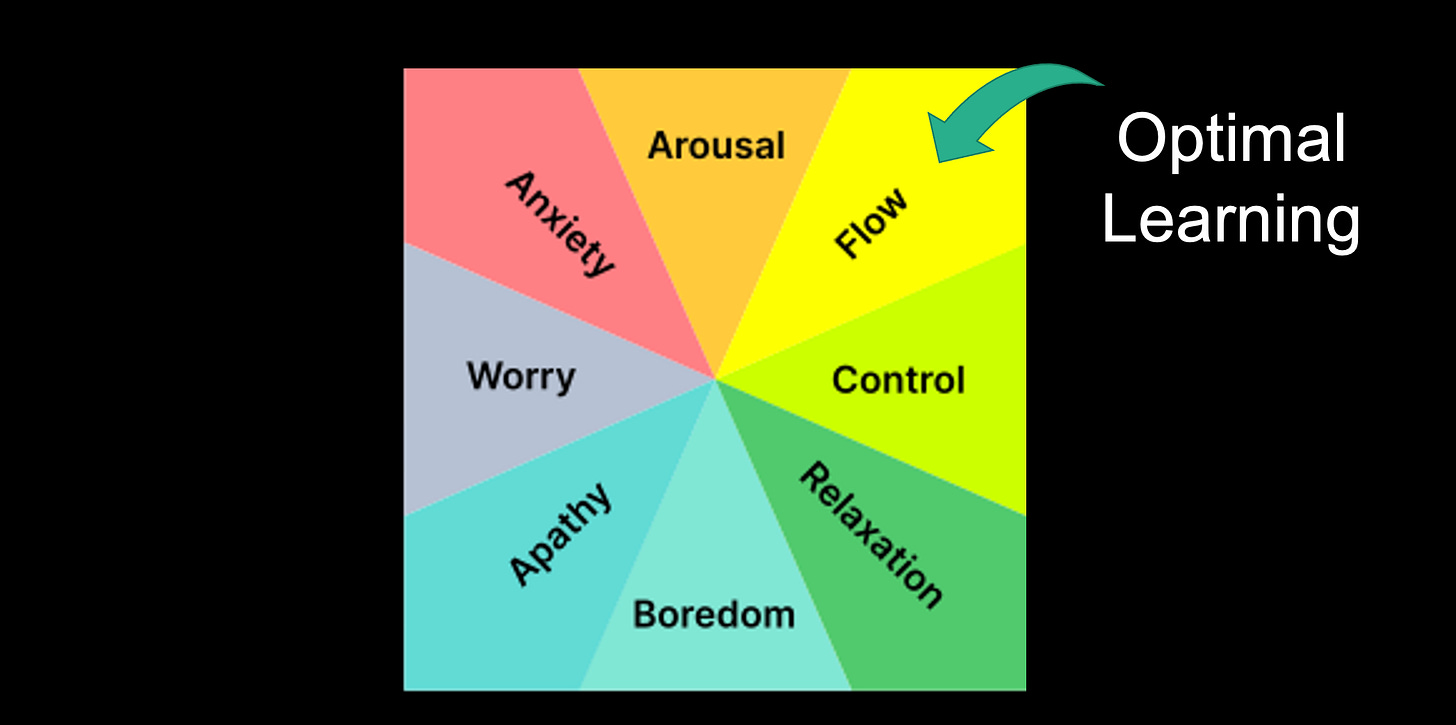Speed Running to the Edge of Knowledge
Careers, education and the future of everything in a world of Artificial Intelligence
Everyone seems to be asking themselves: is what I’m learning to do—or what I’ve already learned to do—going to be relevant in the future?
Yes, you still need to learn the foundations of a field.
But no: you cannot stop at the foundations. You need to speed run to the edge.
This reminded me of the illustrated guide to a PhD that Matt Might wrote a few years ago.
The idea is that you spend the first many years in school gaining generalist knowledge, and then a few years gaining a speciality—and then you get to make a small (but important!) dent in the universe of knowledge through the process of research for your doctorate.

Whether or not you wish to be credentialed as a Ph.D., all of us will need to get to this edge.
AI will enable it.
And AI will require more of us. If you aren’t at the edge, you’ll be doing the work that machines are most likely to replace.
Learning and Flow
One of the chief learnings from game development is the importance of absorbing players into a state of flow. At its core, this is simply balancing between a psychological state that’s neither so hard that you want to give up, nor so easy that you’re bored. It’s in this state when you are most engaged.
In a classroom, a few lucky students might experience a state of flow. But some are bored out of their minds, and some are mentally-checked-out because they don’t understand what’s going on. And even those who are experiencing flow at the moment are probably not experiencing it all of the time.
Rather than the industrial-era forms of education that are still most common, AI will enable each student to receive a personalized learning experience. AI will adjust quantitatively to each student’s level of engagement, account for gaps in their knowledge, and move on when they are impatient for more.

More importantly, it will harness the power of language models trained on a vast corpus of knowledge and information, identifying the path forward that makes the knowledge meaningful to the learner’s own aspirations1 and spares them when it isn’t meaningful.
Here’s the thing: you can start experiencing flow in your learning right now.
You don’t need to wait for futuristic, immersive educational simulations where teachers speak content into existence (although those experiences are coming).
You can begin using AI to create a state of flow around your learning today.
For example, one of the best ways to learn computer programming is to tinker with functioning code. Using GPT-4, I was able to make a simple arcade game in a matter of minutes; this game isn’t going to win any awards, but the important part of it is the interactivity of the experience.
It isn’t simply about prompting a game into existence from ChatGPT (as cool as that is). It is about the iterative back-and-forth as one makes adjustments and sculpts the software into the form desired—or getting inspired to take a new direction along the way.
Through the process, one learns to use tools, the impact of coding changes and the difficulty of implementing certain kinds of changes. And the bugs that ChatGPT makes are an opportunity to learn about bug fixing.
ChatGPT as a Playful Experience
One of the most under-discussed aspects of ChatGPT is that it is simply fun to use.
It is fun because of flow and because the rewards come in the form of rapid progress, the joy of discovery and the anticipation of the uncovering the unknown.
Now, it important to realize that ChatGPT frequently hallucinates. You’ll want to check the feedback it gives you. You should still use search to cross-reference and verify information, especially when using the outputs in ways that could affect people’s lives through misinformation or disinformation.
But with that caveat in mind: don’t fear the fact that AI will likely automate many parts of what you’re learning about. Be like Paul Atreides.
Recall the Litany Against Fear:
I must not fear. Fear is the mind-killer. Fear is the little-death that brings total obliteration. I will face my fear. I will permit it to pass over me and through me. And when it has gone past I will turn the inner eye to see its path. Where the fear has gone there will be nothing. Only I will remain.
— Frank Herbert, Dune
Rather than fear the fact that AI will replace many tasks—embrace the fun of the learning experiences it facilitates.
The things that are well-known enough that the become “best practices” and calculations and procedures—those things will be automated by AI. And the automation is going to happen quickly. On the other hand, you'll learn the established patterns quickly because language models are very good at surfacing such results.2
That doesn’t mean you can skip learning about them: the domain knowledge, the lexicon and the understanding gained within a field will remain important. So learn them, and don’t worry about the fact that computers will do a part of this better.
AI will equip the next billion people on the Earth to become creators: of knowledge, of art, of culture, of meaning.
The point of learning is not to stay in the middle of a field. It is to push the boundaries.
Speed run to the edge of knowledge, my friends.3
Make a dent in the universe.
And then keep pushing… faster than ever before.
My chief criticism of “gamification” is that few of its practitioners actually understand why games work. It isn’t just providing badges, point systems and leaderboards; it requires an understanding of someone’s aspirations within a game so that the experience becomes meaningful for them. Gamified applications that actually do benefit from game design principles provide people with a clear aspiration and the feedback becomes mechanisms for helping them know that their progressing towards it—not vague point systems they will soon forget about.
I wrote about the ability for LLMs to home-in on established patterns more easily as one of the main benefits in Generative AI and True Innovation. The fact that it shows you results that someone else figured out already is a helpful feature—much more helpful than search by itself.
And if you need help on your journey through artificial intelligence, please read The Generative AI Canon.




![[video-to-gif output image] [video-to-gif output image]](https://substackcdn.com/image/fetch/$s_!cv9O!,w_1456,c_limit,f_auto,q_auto:good,fl_lossy/https%3A%2F%2Fsubstack-post-media.s3.amazonaws.com%2Fpublic%2Fimages%2F59887a06-56f8-48c1-947d-e809a4b023e3_600x319.gif)

love this!
Well said! Summarized a lot of the reasons I’m excited to dive more into gpt and gen art